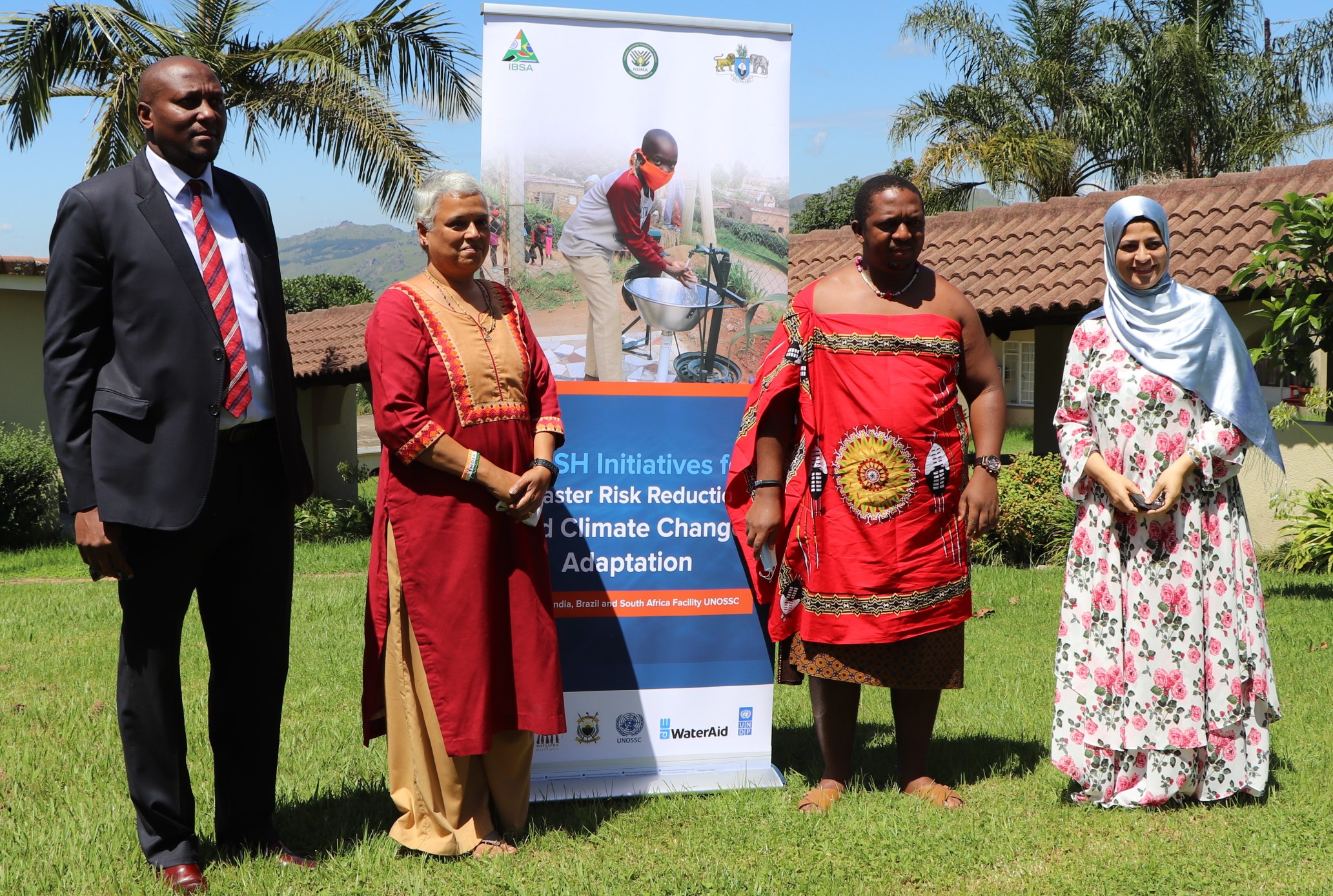NDMA CEO, Mr. Russel Dlamini, India High Commissioner to Eswatini, H.E Radha Venkataraman, Minister of Labour and Social Security, Hon. Phila Buthelezi, and UNDP Deputy Resident Representative, Ms. Shaima Hussein. Photo: UNDP Eswatini
About 3000 people from rural communities across three regions – Hhohho, Manzini and Lubombo – will access clean water for improved sanitation and hygiene. This follows the launch of a project funded by the India, Brazil and South Africa (IBSA) partnership, which will also support 600 farming households from the three regions to improve their production by adopting rainwater harvesting to irrigate backyard gardens and climate-smart agriculture technologies.
The project titled, Addressing Water, Health and Poverty Nexus through WASH Initiatives for COVID-19 and Climate Change Responses in Eswatini, aims to respond to the challenges brought by the interlinkages between health, water, environment, disaster risk and climate change.
This project was initiated by the National Disaster Management Agency (NDMA) and supported by the Ministry of Economic Planning and Development, and WaterAid. UNDP is the designated executing UN agency on behalf of UN Office for South-South Cooperation (UNOSSC) which hosts the IBSA Fund. The Deputy Prime Minister, Senator Themba Nhlanganiso Masuku, who was represented by the Minister of labour and Social Security, Hon. Phila Buthelezi, was the guest speaker at the event. The governments of the IBSA countries were also represented through their High Commissioners.
Speaking at the event, the DPM said the assistance from IBSA countries is provided to the Kingdom of Eswatini during a period when it is needed the most to mitigate the combined impacts of COVID-19 and climate change, which the project will contribute towards addressing.
“The project’s overall goal is to improve health and the well-being of emaSwati as well as contribute towards poverty reduction in Eswatini by enhancing Water, Sanitation and Hygiene practices in both urban and rural areas. The project addresses the water, health and poverty nexus which is manifested in the form of interdependencies that negatively impact on the human well-being,” he said.
This two-year project is scheduled to end in June 2023. The IBSA countries contributed $1 million (E15 million) while WaterAid and NDMA put in $75,000 (E1 140 000) and $55,000 (E840 100) respectively.
Addressing the same event, the High Commissioner of India, H.E Radha Venkataraman, said she was happy that she played a role in ensuring that the proposal for the project got the attention it deserved from the IBSA Board which resulted in its approval.
“IBSA, as you all know already, is a unique initiative of India, Brazil and South Africa to enhance South-South Cooperation for the benefit of the neediest nations of the South by providing fund facilities for the execution of human development projects to advance the fight against poverty and hunger in developing countries,” she said, adding: “NDMA’s concept note attached to the invite for this event elaborated upon the interdependencies of access to water, WASH practices for human health which in turn affects income generation capacity of communities facing lack of water.”
She also pledged her office’s proactive support to Eswatini in connecting it with the relevant Ministries in India which have successfully implemented WASH initiatives.
UNDP Deputy Resident Representative, Ms. Shaima Hussein, said the UN Agency is delighted to provide support in the implementation of the project, which will ensure that there is an exchange of knowledge on technology between the IBSA countries and Eswatini. Ms. Hussein was representing UNDP Resident Representative, Ms. Rose Ssebatindira.
“The project is aligned with the UN Cooperation Framework (2021-2025) and the UNDP global Strategic Plan (2022-2025) which is supporting countries towards three directions of change: structural transformation, leaving no one behind, and building resilience. The project is also in line with four out of the Six UNDP Signature Solutions: poverty and inequality, resilience, environment, and gender equality,” said Ms. Hussein. She also said that the project came at an opportune time as UNDP is rolling out its Country Programme (2021-2025) to fast-track Eswatini’s progress towards meeting the targets of the Sustainable Development Goals by 2030.
In line with the vision of the UN Sustainable Development Goals of building strong partnerships, Ms. Hussein said UNDP is delighted to work with the implementing partners led by the National Disaster Management Agency (NDMA) under the Deputy Prime Minister’s Office. Other partners include WaterAid, Africa Cooperative Action Trust (ACAT), Matsapha and Mbabane municipalities and all stakeholders involved.
“UNDP Eswatini will continue to leverage its global network to facilitate South-South cooperation in India, Brazil and South Africa,” she said.

 Locations
Locations